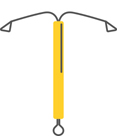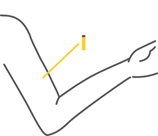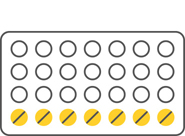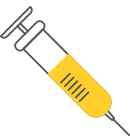Birth Control
Birth Control


Worry free birth control, for $0
Discover the best birth control for you. Your insurance through the Oregon Health Plan covers all options that are available, all at no cost.
Schedule an appointment with your doctor today to find out what’s right for you!
Schedule an appointment today!
Call your doctor directly—look on your Health Share ID card to locate the phone number for your primary care provider. You can also call Health Share at 1-888-519-3845 we’ll help you schedule an appointment with your doctor or another clinic that provides contraception care.
Six questions to ask your doctor
You have options! Talk to your doctor to figure out which option is best for you. At your appointment, here are some questions to help you make an informed choice.
- How private is this method? Will other people know that I am using it?
- What types of side effects (weight gain, period changes, mood) does this method have? How should I manage them?
- Does this method protect against sexually transmitted infections?
- How effective is this method at preventing pregnancy?
- If I decide I want to get pregnant, how long will it take for me to be able to get pregnant after stopping this method?
- What if I mess up and I don’t use this method the way I am supposed to (Forget to take a pill, forget to change my patch, miss my appointment for the shot)? What should I do?
Your options
Check with your local pharmacist—birth control pills and “the patch” may be available directly from your pharmacy without visiting the doctor first.

IUD: A small, T-shaped device inserted into the uterus that prevents sperm and egg from meeting. It lasts from three to 12 years, depending on the type. Some have hormones that will make your period lighter (or even go away). The copper IUD has no hormones.

The implant: A small rod inserted under the skin of your upper arm. It releases hormones to keep your ovaries from releasing eggs and lasts up to four years.

Birth control pills: Taken every day by mouth at the same time of day. They work by releasing hormones that prevent your ovaries from releasing eggs.

The Shot: Given every three months by a doctor, this shot prevents your ovaries from releasing eggs.

The patch: A small, beige, Band-Aid-like patch that is stuck on your skin, it releases hormones that prevent your ovaries from releasing eggs. It must be replaced weekly.

Vaginal ring: A small, bendable ring that you insert into your vagina and replace each month. Its hormones prevent your ovaries from releasing eggs.

Diaphragm: A silicone disk that you insert into your vagina, along with spermicide, each time you have sex. It acts as a barrier to prevent sperm from entering your uterus.

Vasectomy: This is a surgical procedure done on a man to close off the tubes in the scrotum that sperm pass through. Afterwards, the man can ejaculate normally, but there is no sperm in the fluid so he cannot get a woman pregnant. It usually cannot be reversed and is considered permanent.

Tubal ligation: Also known as “having your tubes tied,” this surgical procedure closes off a woman’s fallopian tubes. It usually cannot be reversed and is considered permanent.

